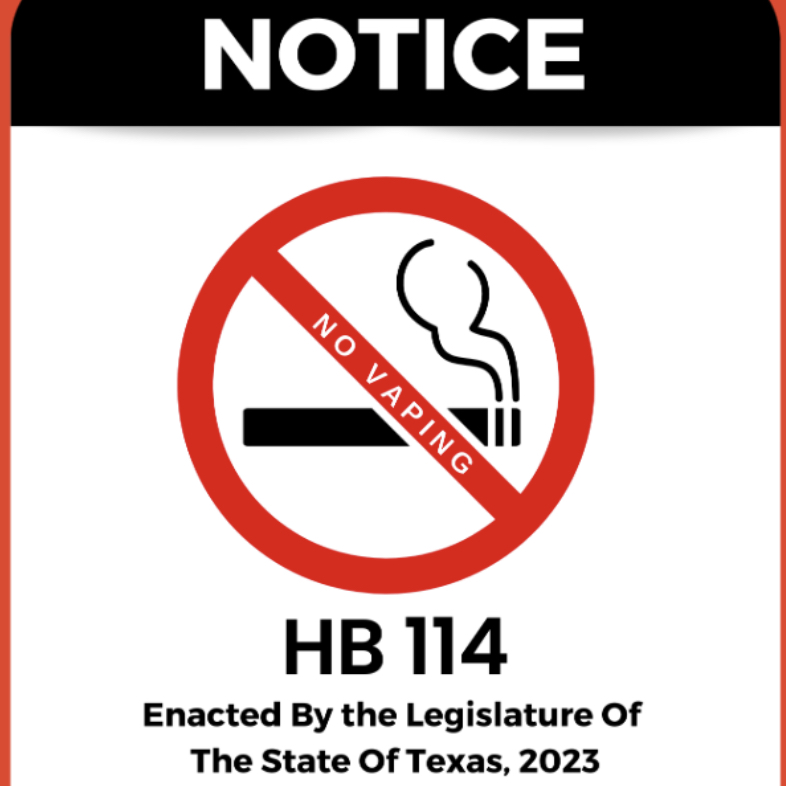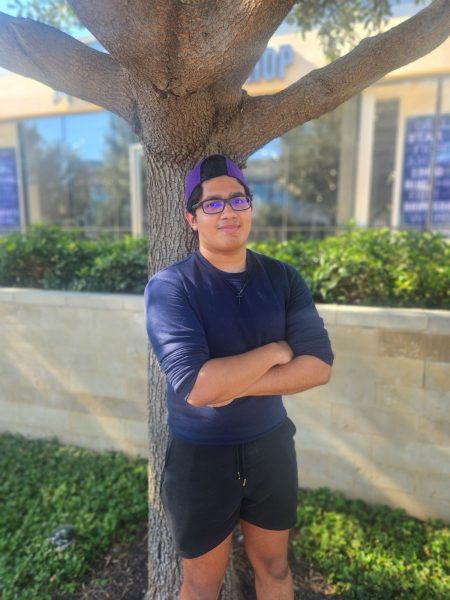Having a vast and quickening rise in the state of Texas, the use of E-cigarettes has affected many communities and individuals. With their highly addictive elements, such as nicotine, drugs have become one of the most prominent issues regarded in Wakeland. However, the newly passed Texas House Bill 114 may reduce the abuse of these immensely compulsive vapes, because of the stricter laws and regulations that counselors and teachers must abide by to keep our schools “vape-free.”
What is Bill 114?
With the introduction of this new law, if students are caught using any form of marijuana or E-cigarettes on school property, they must attend a DAEP (Disciplinary Alternative Education Program) for at least ten days, for their first offense. The amount of days increases with each additional offense.
“Typically, the harsher the consequence is, the less likely it is for students to do it, with this new law discouraging students from trying to vape on school property,” Jeffrey Kerr, an English I teacher at Wakeland said.
While the punishment for vaping may seem strict to some, it is a great way to ward off students who have the urge to use these types of drugs on school premises. Kerr notes that we would also likely see a massive decline in the use of heavier drugs since people often vaping as a way to begin drug usage.
“I think the idea of having a gateway drug is entirely real,” Kerr said. “In general, people who start taking heavier drugs like heroin and fentanyl usually start with smaller ones like vaping and marijuana. This new law [would make] those options less accessible for students.”
What are the downsides to this new law?
While there are numerous positive notations with this new bill, there are still many concerns regarding students’ mental health and the school’s overall care for an individual’s education.
The threat of being sent to alternative schools for vaping may cause distress for students’ and their mental state. For some, vaping can be used as a means to deal with exceeding depression, and being removed from a classroom environment, especially one that students are used to, could be a major shift to a kid’s learning, even if they continue their studies. Kids are also more prone to vaping in outside environments that could get them in legal trouble if they are caught vaping.
“Schools should be trying to help students through their addiction,” Aidan Richardson, a sophomore at Wakeland, said. “Students wouldn’t be getting the help they need by being sent to alternative schools (DAEP), especially when their addiction is severe. In my opinion, they should be sent to a rehab center of some sort, or another type of help center, rather than being punished for it.”
A student’s successfulness in their academics is also greatly affected by their extended time away from their high school’s environment. Kids will likely struggle with getting back in the swing of their previous classroom schedule, especially if it is their second or third offense.
Without a consistent education structure, students will be unable to ingest all the information they need to pass the class or even the year, and this can set their future back exceedingly, especially for the higher grades who have to complete college applications.
“Going to another highschool and disrupting one’s education is very challenging for the student,” Kerr said. “Putting a pause on one’s learning is something I am very mixed on, and I am concerned regarding the students’ educational opportunities.”
Bill 114 will have an impact on an enormous number of Texas school districts with many potentially positive and negative outcomes.
The amount of vapes, and potentially other drugs, being used on school property could be vastly reduced due to the many risks being at play if one decides to take the leap of faith. But on the flipside, massive disruptions in one’s consistent education, and untreated mental health states still deluge this new law.
Only time and results will truly be able to tell whether or not Bill 114 will stand as an effective way to control the abundance of vapes used in Texas high schools or if it will be another failed attempt at trying to control the large amount of drug use in public schools.
“Experimenting with this new law is the best way to go,” says Kerr. “It will prove whether or not this law will be valuable to keeping our schools a safe place to learn, or if it will cause students trouble and discouragement more than anything.”




Lisa • May 6, 2024 at 10:54 am
Looking at Texas Great School statistics and the average GPA- seems the administration and governor need to focus more on improving academics rather than punishment. For a highschool to entertain snitches seems a bit elementary to me. Texas should take a look at some other schools in the nation where they have more freedom of choices and better academic scores. Let teenagers be teenagers. A lot of money involved in funding a DAP school and other programs which do not help academic success. Academic success doesn’t seem to be that important to Texas. My daughter will probably lose her job since the DAP school is in session until after 5pm. The hours should at least be the same as a normal school day. I think ISS is a strict enough punishment for possessing a nicotine vape. 20 years ago schools had smoking areas and now they’re being sent away?